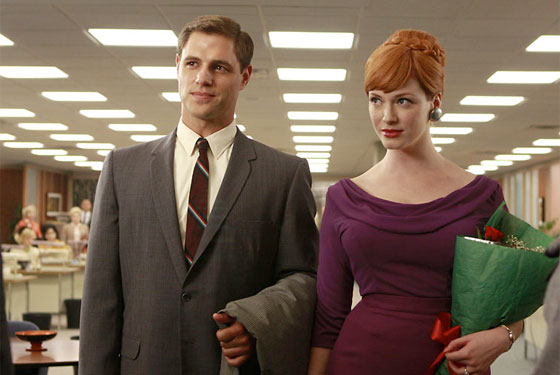
Last Sunday, Joan was raped and everything changed.
If that sounds like an over-the-top way to talk about a fictional character, I can’t help it. For two seasons, Joan, played with wriggling brass by the excellent Christina Hendricks, has been the swizzle stick that stirred the series. At once a real person and an iconographic cartoon, she was a retro Samantha Jones, a third-wave feminist before her time, eternally articulating one form of female power: the potent combination of an arched eyebrow and a tight green skirt.
And if there were a few cracks in that Jessica Rabbit veneer, if Joan’s power was dependent on pleasing powerful men, if there was something disturbing in her sudden veer toward marriage? Well, she still seemed like someone capable of handling anything, even the passage of time.
Then in last week’s episode, Joan’s power turned against her. And what made it particularly cruel was that her fiancé’s assault was a poisoned parody of the boss-secretary role-play that was her specialty, forced on her by someone who wanted to humiliate her for her history. Joan had always emphasized the importance of discretion, and now she was locked into a different kind of secret: If she had screamed, she would have been office gossip, and no one would have called it rape anyway.
Mad Men has always acted as a vicarious time machine; in the first season, there was a definite ambiguity to the show’s critiques, mixed as they were with nostalgia for a world of gimlets and clear gender roles. For female viewers, it was possible to have a fleeting sense of “weren’t things easier then?” — back when the choices were narrower, when dinner was paid for, when expectations were lower?
But as the show has focused ever more tightly on its trinity of women — Betty the Wife, Peggy the Career Girl, Joan the Mistress — that nostalgia has warped. Betty was trapped; Peggy was thwarted. Only Joan still seemed somehow free, and that scene, so poignantly filmed, ending with her disassociated gaze under the coffee table, stamped that fantasy shut.
As the season ends, Joan’s rape could lead to plenty of outcomes: She could leave her fiancé; she could tell someone (Peggy? Sterling?); she could become single again; she could change her life, change her style, change her job, move on, reinvent herself with the changing times, the changing politics, use this terrible thing as a catalyst instead of something that freezes her in place.
But if the show holds true to its darkest impulses, nothing will happen at all.

